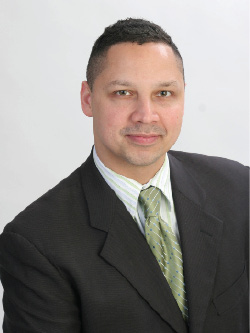Filed Under > TC Entrepreneurs
Entrepreneurial Spotlight: Overcoming the Opportunity Gap
Ramon Gonzalez has created a successful middle school in one of New York City's most challenging areas. Next up: a public boarding high school
Ramon Gonzalez has created a successful middle school in one of New York City’s most challenging areas. Next up: a public boarding high school
By Elizabeth Dwoskin
“We can’t afford good teachers,” Ramon Gonzalez, Principal of the Lab School of Finance and Technology, tells his staff. “We need great teachers.”
The Lab School stands in a South Bronx zip code where seven other middle schools have closed since 2003, most after receiving failing grades. When Gonzalez, a former TC Cahn Fellow and current doctoral student, founded the Lab School seven years ago, the incoming class of 150 sixth graders was reading and doing math at just 10 percent of statewide proficiency levels. The students had been rerouted from the City’s most dangerous middle school.
Today, Lab School students—all of whom are from low-income, minority families—are reading at 65 percent proficiency and scoring at 80 percent proficiency in math. The school received an A for the past three years and last year was one of three schools nationwide honored in math as an Intel Corporation “School of Distinction.”
Those accomplishments reflect Gonzalez’s focus on overcoming an “opportunity gap.” He takes Lab School students on overnight trips to Rutgers, Harvard and other top institutions. He gives each student a personal computer. His teachers host after-school book clubs.
But Gonzalez’s biggest contribution may be a curriculum he has developed on financial literacy. In sixth grade, each student creates a personal budget. By eighth grade, the budgets become business plans the students market to their teachers and classmates on a Web site they build from scratch. At the donor-supported school store, students use “school bucks”—awarded for good behavior and scholarship—to buy school supplies. They can also bank their school bucks and earn 10 percent interest.
Gonzalez believes the curriculum fosters crucial decision-making skills. “A lot of my kids don’t have the luxury of making a poor decision. Many are one decision away from being in a really bad environment.”
A few students have become entrepreneurs. One repairs bikes, another runs a Web hosting company.
The idea for the financial literacy curriculum grew out of Gonzalez’s graduate research into the entrepreneurial underground economies of gangs. Growing up in East Harlem in the drug-ridden ’80s, Gonzalez had many friends who were gang members, including some who were murdered. Thanks to a mentor at the local Boys Club, Gonzalez himself ended up going to boarding school and then Cornell. Today, he encourages his teaching staff to be mentors and ensures that half of his teachers are men—including many of color. He frequently reminds his students that he is a student, too.
Worried about the poor-quality Bronx high schools for which most of his graduates are zoned, Gonzalez has proposed expanding the Lab School to include grades nine through 12. Next up, if that happens: turning the high school into New York City’s first public boarding school.
Published Monday, Nov. 22, 2010
